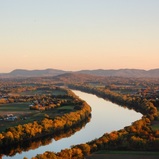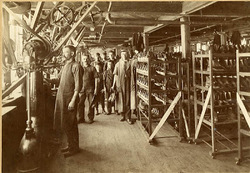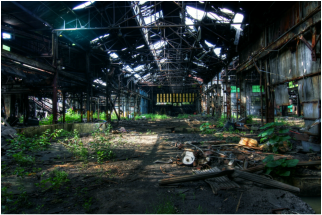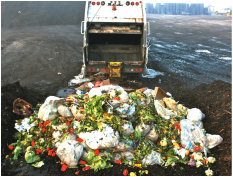 Shouldn't an issue like destruction of life on earth bring us together? A discussion of why politics of the oligarchy and corporatism is destroying us. A discussion of renewed hope and economic opportunity. How did We get Here To understand how we got to where we are when it comes to the discussion of climate change it is important to understand how we perceive our environment. Western perception of how we see ourselves in the greater world go back beyond the formation of modern consumerism, itself a movement of the 19th century as rural life transitioned to urban consumer life with industrialization. Matters of religion have also played a role. The idea of needing to cleanse oneself, to 'rise above' sin, to not give in to 'natural' temptations have over many centuries effected where we position ourselves in the environment. These ideas have largely positioned us against our environment. Political ideas like the American Manifest Destiny tied together a political and religious argument for conquering the natural world and any cultural groups who would stand in the way of 'progress'. A complex set of phenomenon, no less than the totality of human experience has brought us to where we are. Where we are is not where we want to be. The Moral Dilemma A moral argument behind climate change is being made on both sides. Those for recognizing the consequences of climate change realize that if in fact we adhere to a fundamental set of morals then the pain of one group of people caused by environmental degradation is the pain shared by us all. Climate change that destroys the Maldives should be a call to arms for the rest of us to change course. The opposite argument is being made by those who say sweeping changes to the way we do business, amass wealth, and provide the basics for our families should not be impeded for something which may not even exist. So who benefits given the real outcome? The argument needs to start where it's most personal. Most likely you wouldn't shit in your own living room. You also wouldn’t take some of your solid waste from a weekly trash collection, throw in a few chemicals you no longer need and deliver them promptly to your neighbor’s back yard. Why? It would be disrespectful to ourselves and to those immediately around us. Both scenarios may impede our personal or our neighbor's ability to live a healthy life, to grow food, to live in a politically and socially stable community. There is also somewhere deep within our conscious a voice that speaks to us. That voice says to do these things would be wrong. With this in mind, our ideas regulating personal behavior should encompass an ever-wider circle of people to include cultural groups, nations, and continents. So why do our efforts to protect our environment stop there? NIMBY to the Rescue We in the western world have become experts in externalization. We keep meat cheap by developing CAFOs. But the meat produced really isn't cheap. The cost is felt by all of us outside of the consumer price for that meat. The same goes for most of our food. The same for many of our consumer products. Same for most of the services we need and desire to offer to others in order to make a living. Who Benefits from the Course We're On? The reality is nobody on the planet benefits from climate change. But in a corporatized society an ever-smaller number of wealthy individuals can continue to externalize the issues, passing the buck on a growing number of impoverished individuals with little choice in the matter. In an oligarchy controlled by profit and profit only one can build walls around themselves to control their immediate environment...for a time. Sooner or later the hurricane will hit, the floods will devastate, the drought will destroy and long before that the peasants may revolt. An Argument for Change There is a moral obligation we have to each other and to ourselves to recognize climate change for what it is and take action collectively to make substantive improvements. There is also a credible argument backed by proof that the economics of climate change can be positive. Economic benefits from our attempts to mitigate climate change and conserve energy can have a positive effect through entrepreneurship across class and cultural boundaries. The opportunities for entrepreneurship in renewable energy, energy storage, water quality and distribution, agribusiness and social enterprise plus many more sectors present a real chance for millions of global partners to realize their personal and professional goals in a sustainable manner. New Businesses around the world most often lead by a new crop of social entrepreneurs who will teach the establishment a new way of doing business. In a country as polarized as the United States of America climate change should be a topic used to bind us together. Secularists and the religious, moralists and pragmatists, economists and idealists alike need air, water and a sustainable environmental cycle to survive. They also need economic opportunity and a renewed focus on moving forward as a political body, not stuck focusing on the past or on perpetuating economic and political systems that do not benefit the majority. Climate Change presents an opportunity for our working class and professional class to bind together in order to realize a new economic stream with opportunities for all, based on solid science and a moral code. Climate Change presents a unique moment; one where we can renew a social compact with each other. Without it, our present course of profit at all costs will end up destroying us in conflict. Without a dramatic change the only question will be by what means: armed conflict or environment disaster. Climate change presents a chance for hope. An opportunity for real change from the bottom up. A chance to re-think our place on the planet and how we interact with every other living being. Additional Resources TED Radio Hour Podcast 'The Hackers' 12.06.13 Scott Graves is passionate about helping business owners. Tune in to his podcast series 'No Boundaries Radio' on the No Boundaries Radio Network. Meet him at the crossroads between strategy and innovation at [email protected] or twitter @smgcreative.
2 Comments
 I'd like to discuss the importance of Organics to Energy O2E) by focusing on it's potential impact on democracy. We are currently in an age of disempowerment for a vast portion of the population. All around the world the promise of prosperity according to our concept of a 'free market' has not born fruit for most citizens. Folks representing all stripes find themselves feeling disempowered by a system that has cast them from their job while narrowing future opportunity in a number of strategic ways. We seem to consistently ignore the fact that the intent of industrialization, an important factor of current global markets is to replace human labor with technology. What to do with those lives 'freed' from the 'drudgery' of their own labor? We haven't answered that question.  The disempowerment I describe is exacerbated by the severe lack of capital to start or grow one's own small business. No jobs available? No problem for those of us willing to take risk and grow a new enterprise....unless one does not have access to the resources necessary for self-starting. Then the medical and education bills pile up. And the energy bills. And supposedly it is our patriotic duty to consume more? In an age when one has no control over their career, no control over most social problems, no control over major systems or even their very own food supply a feeling of helplessness ensues. I am here to tell you WE ARE MORE THAN MERE CONSUMERS. Our position as Organics to Energy Developers came about for a number of factors.
 Nobody desires to be forced to reinvent themselves faster than they could ever realize a goal to fruition. A short-term approach to business is also a reductive approach to business. Reducing the number of gainfully employed career oriented people. Reducing the number of farmers and the capacity of farmers to work as stewards of the land. Reducing the typical person's ability to realize personal goals in line with and not in spite of the interests of their greater community. This type of mindset takes local control away, decimating small communities and their people. In our mind this is not only unsustainable. It is also not a 'free' market. It is simply undemocratic. A network of diversified communities with a vibrant business sector breeds a sense of community. A Sense of Empowerment. A sense of Creativity. Organics to Energy projects, when coupled with the right long-term economic development policy can play a prime role in supporting entrepreneurship and local control.  Scott Graves and SMGraves Associates is responsible for the business model behind the Solaya O2E Advantage. Tune in to his podcast series 'No Boundaries Radio' on the No Boundaries Radio Network. Meet him at the crossroads between strategy and innovation at [email protected] or twitter @smgcreative.  The renewable energy segment commonly referred to as Waste-to-Energy or Organics-to-Energy (O2E) promises a compelling combination of benefits to investors and to society. Diversion of Organic Waste Technologies such as Anaerobic Digestion, Pyrolysis and Composting offer society the opportunity to create a variety of products beneficial to communities. These products include fertilizers, biochar, and renewable forms of energy. But it doesn't end there. By diverting organic wastes such as pre- and post-consumer food, wastewater biosolids and agricultural or other green wastes away from landfills we reduce costs to the taxpayer while generating income from the diversion of waste through multiple revenue streams. Production of Renewable Energy Processing organic waste through Anaerobic Digestion, Pyrolysis and other Organics-to-Energy (O2E) technologies results in two primary forms of renewable energy. Producers and the consumers who support them either generate electricity or biologically derived Biomethane, used as is or further processed into Compressed Natural Gas (BioCNG). Investors take note: As the US exports more of its own extracted Natural Gas overseas, domestic prices are likely to increase making the need for BioCNG (think large commercial fleets) or BioMethane (used just like natural gas) an even smarter investment. Improved Food Supply Chain When we discuss the issues facing our food supply we are really discussing a multiplicity of issues.
Making use of O2E technologies can reduce or eliminate several of these factors when deployed using lucrative business models. Nutrients are better managed due to the processing of raw manures and other waste streams into more readily available, therefore manageable forms. By its very nature, producing fertilizers using O2E technologies empowers regional entrepreneurs to produce revenue on a local scale facility to facility in a replicable and relatively inexpensive footprint. Based on Solid Science All technology platforms mentioned in this article are based on solid science and simple, elegant engineering. As an example, the precursor technology to our most current form of anaerobic digestion was a result of solutions developed during WWII by American engineers i.e. the tech has been proven and in use around the world for over seven decades. Preferable ROI Timeframe While factors including technology, facility footprint, business model, regional marketplace, etc. effect the return on investment expectations for an O2E project, the independently owned and operated facility, particularly one dependent on a diversified set of revenue streams can show a sizable return within a 5-10 year period without grants or subsidies. Even at longer timeframes O2E presents a favorable investment when placed against other beneficial forms of renewable energy such as solar or wind. Why Should I consider being a part of O2E? Why should the investor appreciate small-scale, replicable facilities of the kind suggested here? In addition to the reasons stated above consider:
 Scott Graves and SMGraves Associates is responsible for the business model behind the Solaya O2E Advantage. Tune in to his podcast series 'No Boundaries Radio' on the No Boundaries Radio Network. Meet him at the crossroads between strategy and innovation at [email protected] or twitter @smgcreative. |
Scott M. GravesScott Graves and SMGraves Associates is responsible for the business model behind the Solaya O2E Advantage. Tune in to his podcast series 'No Boundaries Radio' on the No Boundaries Radio Network. Meet him at the crossroads between strategy and innovation at [email protected] or twitter @smgcreative. ArchivesInvestor Relations
|
Solaya Energy LLC, Copyright © 2022


 RSS Feed
RSS Feed
